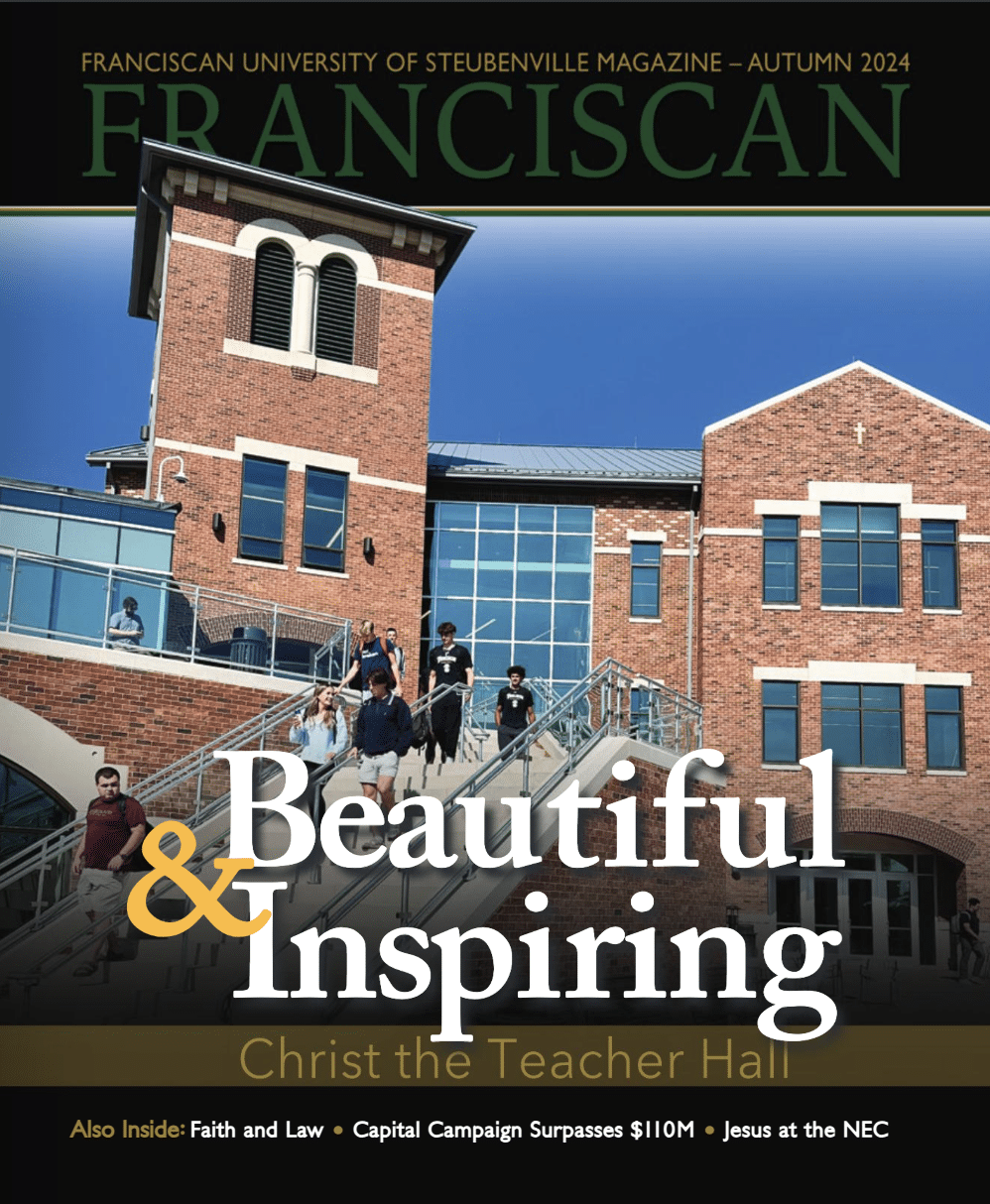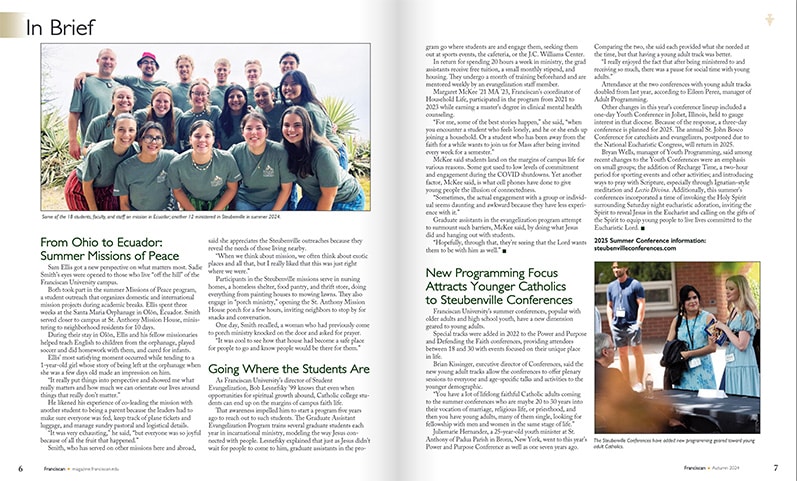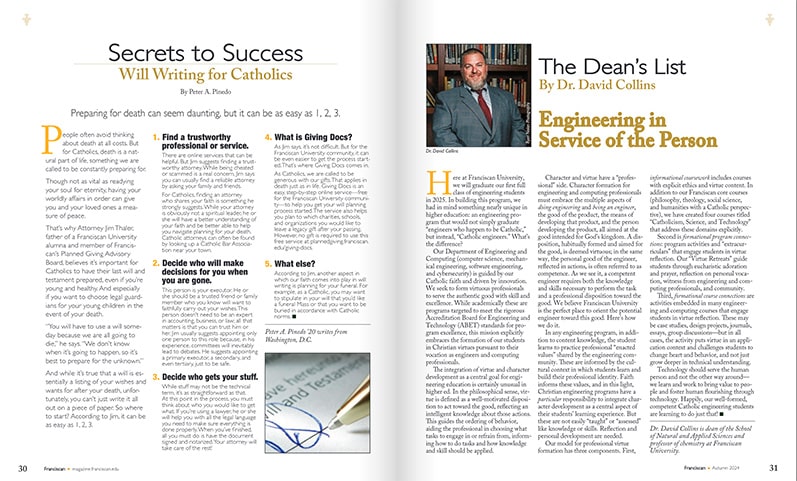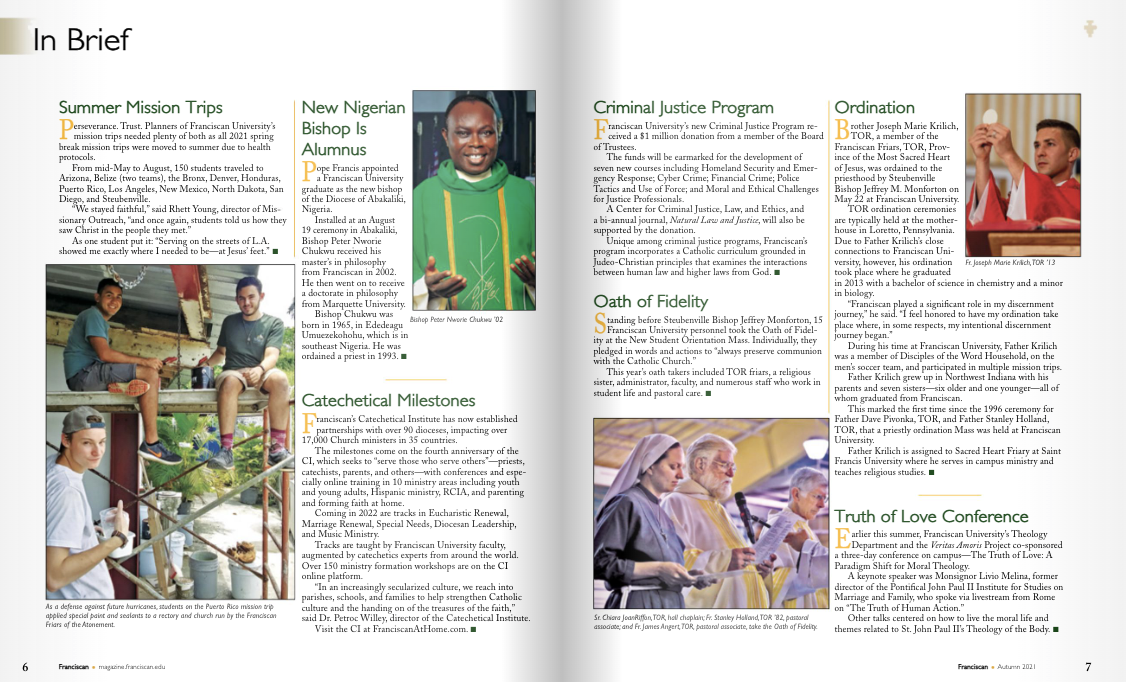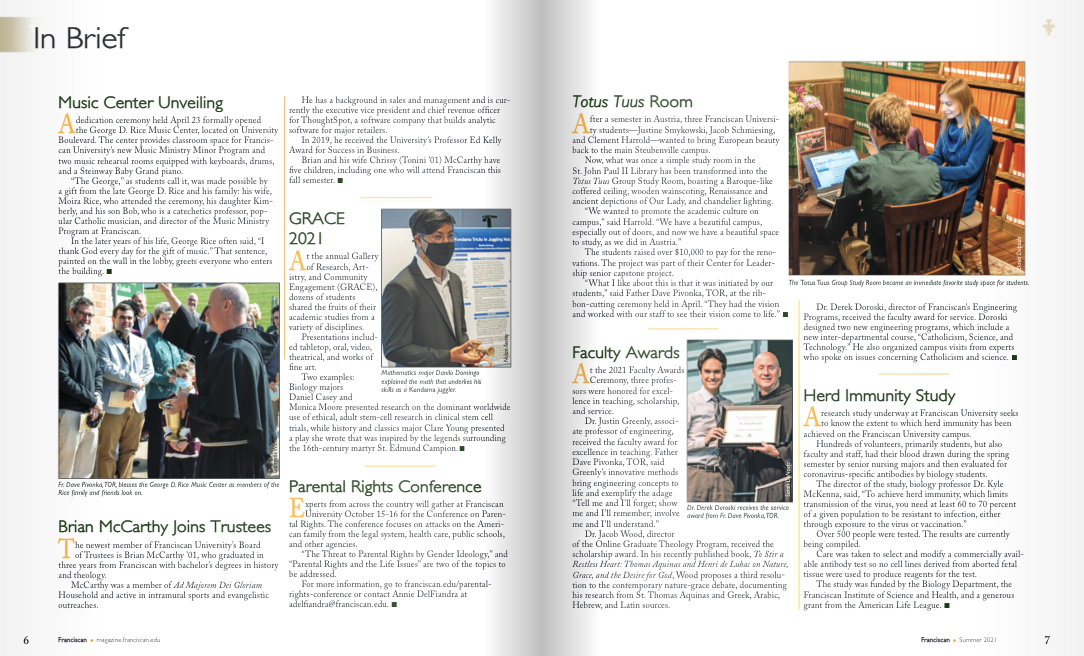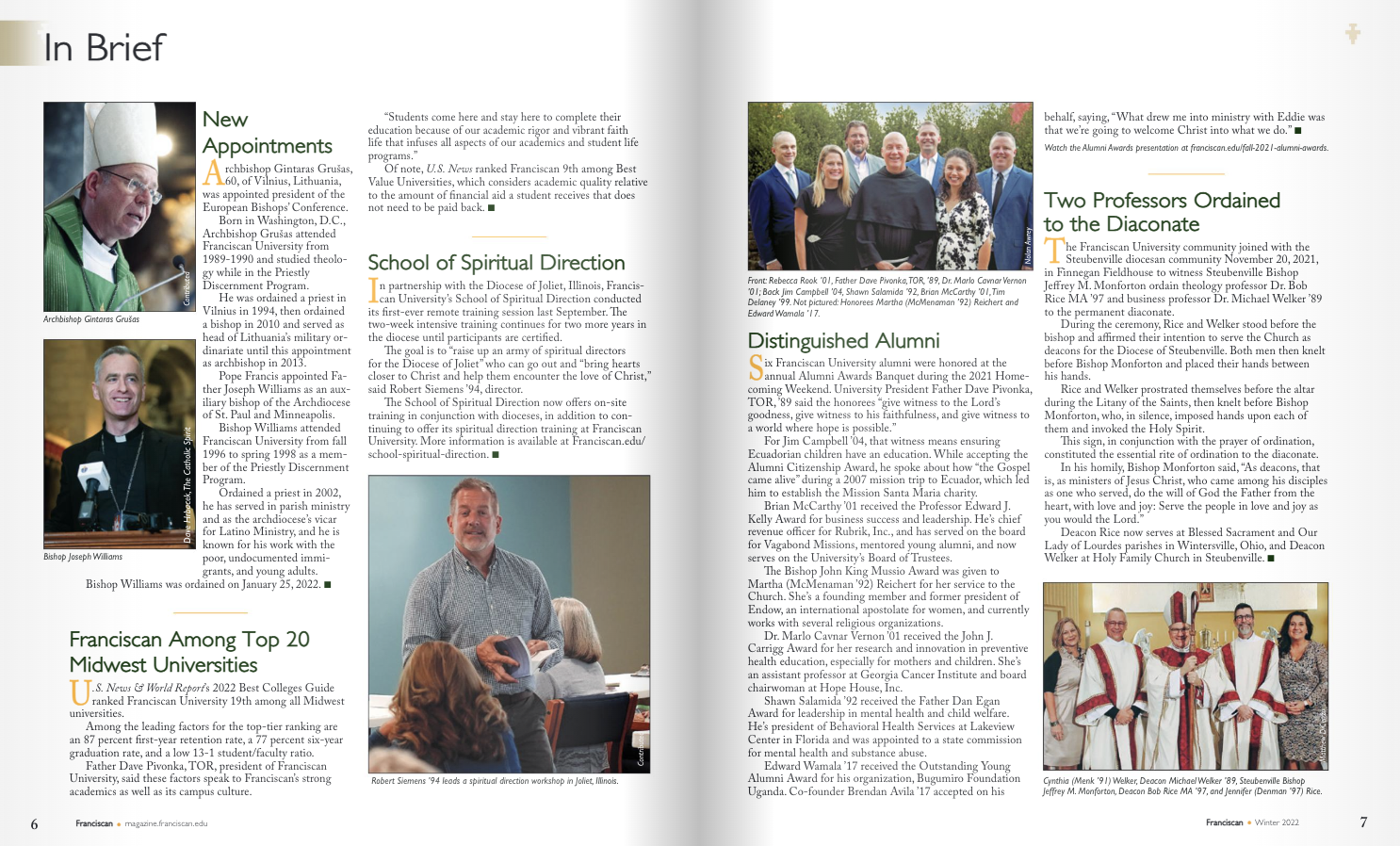From Ohio to Ecuador: Summer Missions of Peace
Sam Ellis got a new perspective on what matters most. Sadie Smith’s eyes were opened to those who live “off the hill” of the Franciscan University campus.
Both took part in the summer Missions of Peace program, a student outreach that organizes domestic and international mission projects during academic breaks. Ellis spent three weeks at the Santa Maria Orphanage in Olôn, Ecuador. Smith served closer to campus at St. Anthony Mission House, ministering to neighborhood residents for 10 days.
During their stay in Olôn, Ellis and his fellow missionaries helped teach English to children from the orphanage, played soccer and did homework with them, and cared for infants.
Ellis’ most satisfying moment occurred while tending to a 1-year-old girl whose story of being left at the orphanage when she was a few days old made an impression on him.
“It really put things into perspective and showed me what really matters and how much we can orientate our lives around things that really don’t matter.”

Some of the 18 students, faculty, and staff on mission in Ecuador; another 12 ministered in Steubenville in summer 2024.
He likened his experience of co-leading the mission with another student to being a parent because the leaders had to make sure everyone was fed, keep track of plane tickets and luggage, and manage sundry pastoral and logistical details.
“It was very exhausting,” he said, “but everyone was so joyful because of all the fruit that happened.”
Smith, who has served on other missions here and abroad, said she appreciates the Steubenville outreaches because they reveal the needs of those living nearby.
“When we think about mission, we often think about exotic places and all that, but I really liked that this was just right where we were.”
Participants in the Steubenville missions serve in nursing homes, a homeless shelter, food pantry, and thrift store, doing everything from painting houses to mowing lawns. They also engage in “porch ministry,” opening the St. Anthony Mission House porch for a few hours, inviting neighbors to stop by for snacks and conversation.
One day, Smith recalled, a woman who had previously come to porch ministry knocked on the door and asked for prayer.
“It was cool to see how that house had become a safe place for people to go and know people would be there for them.”
Going Where the Students Are
As Franciscan University’s director of Student Evangelization, Bob Lesnefsky ’99 knows that even when opportunities for spiritual growth abound, Catholic college students can end up on the margins of campus faith life.
That awareness impelled him to start a program five years ago to reach out to such students. The Graduate Assistant Evangelization Program trains several graduate students each year in incarnational ministry, modeling the way Jesus connected with people. Lesnefsky explained that just as Jesus didn’t wait for people to come to him, graduate assistants in the program go where students are and engage them, seeking them out at sports events, the cafeteria, or the J.C. Williams Center.
In return for spending 20 hours a week in ministry, the grad assistants receive free tuition, a small monthly stipend, and housing. They undergo a month of training beforehand and are mentored weekly by an evangelization staff member.
Margaret McKee ’21 MA ’23, Franciscan’s coordinator of Household Life, participated in the program from 2021 to 2023 while earning a master’s degree in clinical mental health counseling.
“For me, some of the best stories happen,” she said, “when you encounter a student who feels lonely, and he or she ends up joining a household. Or a student who has been away from the faith for a while wants to join us for Mass after being invited every week for a semester.”
McKee said students land on the margins of campus life for various reasons. Some got used to low levels of commitment and engagement during the COVID shutdowns. Yet another factor, McKee said, is what cell phones have done to give young people the illusion of connectedness.
“Sometimes, the actual engagement with a group or individual seems daunting and awkward because they have less experience with it.”
Graduate assistants in the evangelization program attempt to surmount such barriers, McKee said, by doing what Jesus did and hanging out with students.
“Hopefully, through that, they’re seeing that the Lord wants them to be with him as well.”
New Programming Focus Attracts Younger Catholics to Steubenville Conferences
Franciscan University’s summer conferences, popular with older adults and high school youth, have a new dimension geared to young adults.
Special tracks were added in 2022 to the Power and Purpose and Defending the Faith conferences, providing attendees between 18 and 30 with events focused on their unique place in life.
Brian Kissinger, executive director of Conferences, said the new young adult tracks allow the conferences to offer plenary sessions to everyone and age-specific talks and activities to the younger demographic.
“You have a lot of lifelong faithful Catholic adults coming to the summer conferences who are maybe 20 to 30 years into their vocation of marriage, religious life, or priesthood, and then you have young adults, many of them single, looking for fellowship with men and women in the same stage of life.”
Juliemarie Hernandez, a 25-year-old youth minister at St. Anthony of Padua Parish in Bronx, New York, went to this year’s Power and Purpose Conference as well as one seven years ago. Comparing the two, she said each provided what she needed at the time, but that having a young adult track was better.
“I really enjoyed the fact that after being ministered to and receiving so much, there was a pause for social time with young adults.”
Attendance at the two conferences with young adult tracks doubled from last year, according to Eileen Perez, manager of Adult Programming.
Other changes in this year’s conference lineup included a one-day Youth Conference in Joliet, Illinois, held to gauge interest in that diocese. Because of the response, a three-day conference is planned for 2025. The annual St. John Bosco Conference for catechists and evangelizers, postponed due to the National Eucharistic Congress, will return in 2025.
Bryan Wells, manager of Youth Programming, said among recent changes to the Youth Conferences were an emphasis on small groups; the addition of Recharge Time, a two-hour period for sporting events and other activities; and introducing ways to pray with Scripture, especially through Ignatian-style meditation and Lectio Divina. Additionally, this summer’s conferences incorporated a time of invoking the Holy Spirit surrounding Saturday night eucharistic adoration, inviting the Spirit to reveal Jesus in the Eucharist and calling on the gifts of the Spirit to equip young people to live lives committed to the Eucharistic Lord.
2025 Summer Conference information: steubenvilleconferences.com
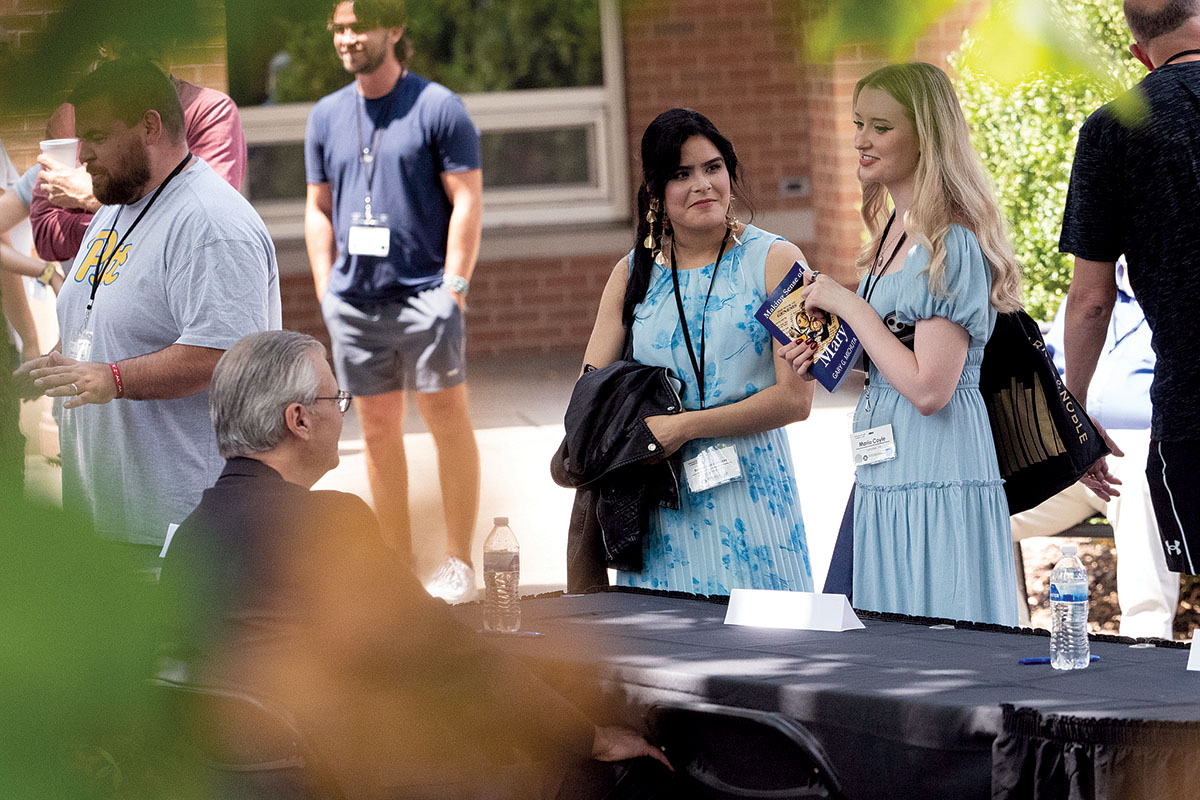
The Steubenville Conferences have added new programming geared toward young
FaithandReason.com Expands Offerings
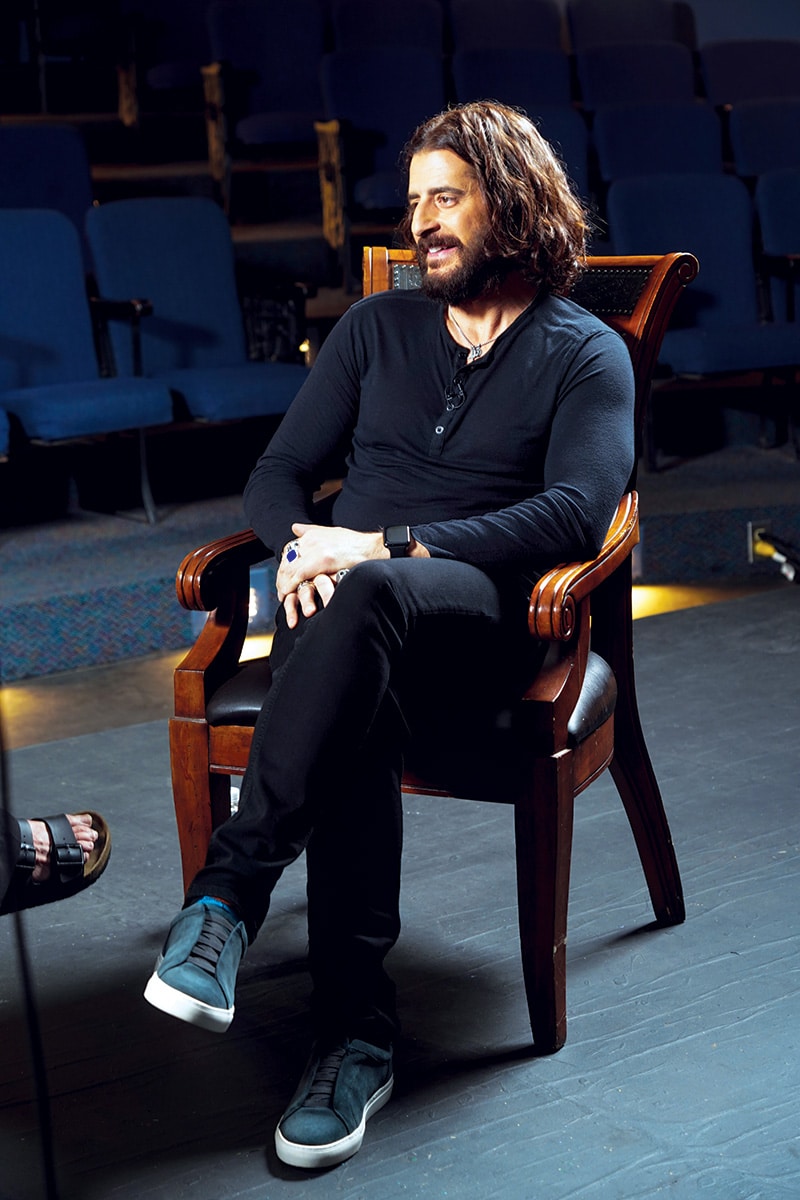
Actor Jonathan Roumie on In Person
Franciscan University’s Faith and Reason online platform is expanding its content offerings with the addition of In Focus, a free video series, and three other new programs.
In Focus examines culture, science, politics, the arts, and current issues through the lens of faith and reason. For the first installment of these seven-part series, host and University President Father Dave Pivonka, TOR ’89, spoke with author Noelle Mering MA ’22 on how Catholics can address woke ideology.
Mering developed themes from her book, Awake, Not Woke: A Christian Response to the Cult of Progressive Ideology.
The second In Focus series, “Scripture Changes Everything,” features Dr. Scott Hahn, Franciscan professor of Biblical Theology and the New Evangelization.
Other new Faith and Reason additions include Scripture Reflections, in which Father Dave and Franciscan TOR friars expound on Sunday Mass readings; The Spirit and the Bride podcast, with Dr. Alan Schreck, Franciscan professor emeritus of theology, who traces the work of the Holy Spirit throughout Church history; and In Person, featuring interviews by Father Dave with such figures as The Chosen actor Jonathan Roumie; Bishop Frank Caggiano of Bridgeport, Connecticut; and Super Bowl champion Matt Birk.
Sign up to watch for free at faithandreason.com.
Strengthening Catholic Leaders
What is envisioned as an annual catechetical conference drew 35 leaders in evangelization to Franciscan University’s Gaming, Austria, site in May as part of an effort to foster conversion and the move of the Holy Spirit in Eastern Europe.
Those attending included priests, diocesan catechesis and evangelization directors, a university professor, and laypeople working for parishes, institutes, ministries, and Catholic radio in Slovenia, Slovakia, Romania, Lithuania, Latvia, Hungary, Poland, the Czech Republic, and Austria.
Lydia Schawer, whose work in the Department of Adult Education for the Diocese of St. Pölten, Austria, centers on discipleship and formation, went to the conference for continued learning but also in hopes of exchanging experiences and best practices with colleagues in other dioceses.
“I loved the teaching that we got … and it was very helpful in further mapping out the work I will be doing.”
But she said the conference also showed her the importance of connecting with others in the field and learning that they face similar challenges.
Dr. Scott Sollom ’94 MA ’98, professor of theology and director of Franciscan’s Catechetical Institute, said the seeds of the four-day conference were planted in 2019 during a mini-conference organized to identify the needs of catechists in Eastern Europe. The latest event built on relationships cultivated at that conference and focused on strengthening leaders through prayer, community, and catechetical formation.
“Basically, with evangelization and catechesis in the whole Church, the secret sauce is being in human relationships,” Sollom said. “This was a great time for these people who are significant leaders in dioceses, parishes, and institutions to meet each other and share what ministry is, cultivating relationships that hopefully will continue to grow and flourish.”
“A Better Way” to Do Humanitarian Service
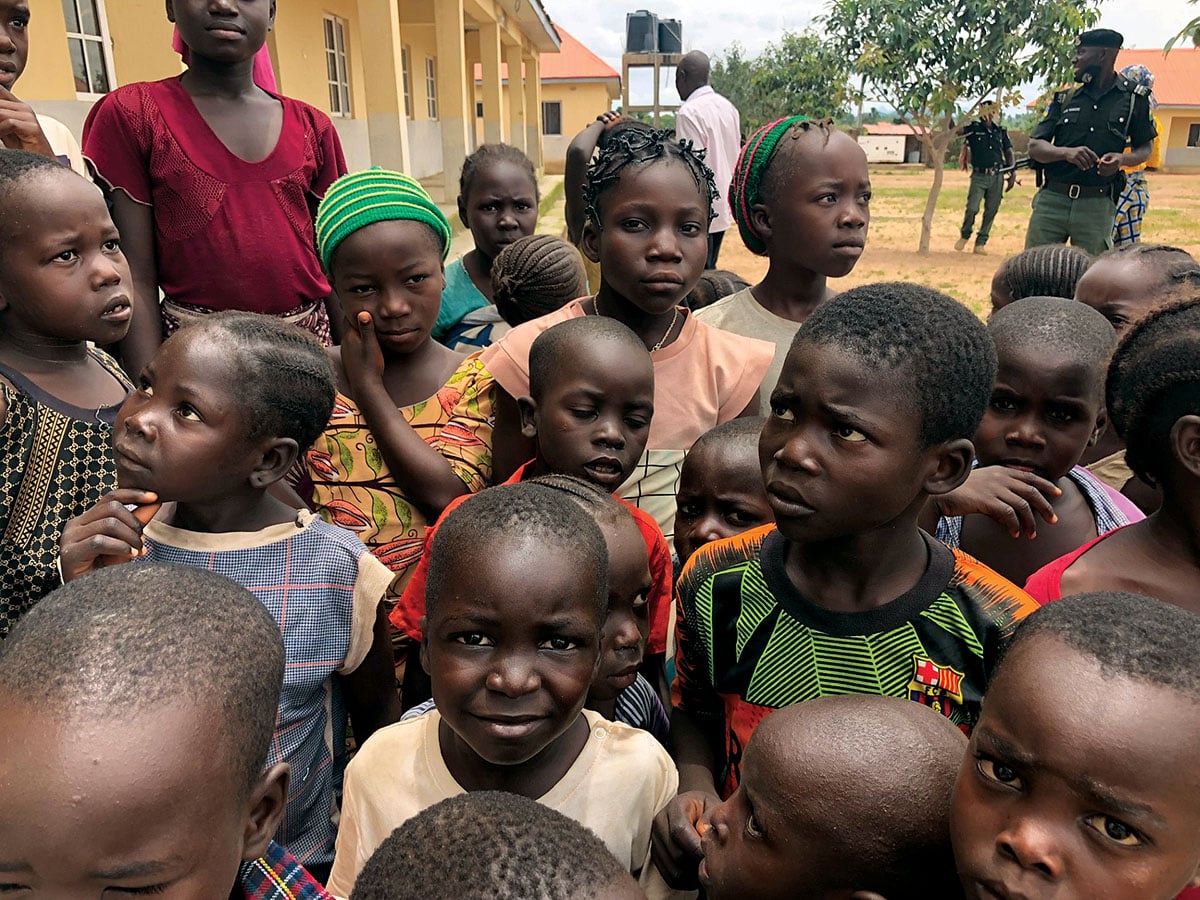
Children of families forced from their homes by Boko Haram violence, who now live in Northeast Nigeria, an area of focus for the ICHS.
An institute designed to meet the need for humanitarian service professionals formed in Catholic faith and morals has been established at Franciscan University.
Using theology formation, practical training, and field experience, the Institute for Catholic Humanitarian Service (ICHS) equips students and others to embrace humanitarian service as a vocation and provide practical aid locally and globally.
Stephen M. Rasche, founding director, sees ICHS responding to a practical and moral problem in international humanitarian service: “Those of us with experience working closely with the marginalized in the field, often through the Church, have seen how little of the mainstream aid reaches those most in need. And we have also seen how often the aid they receive comes with the condition that they adopt controversial, ideological social objectives, which rob those in need of their most basic human dignity.”
Rasche, a faculty fellow at Franciscan and an attorney, has more than 35 years of experience in Catholic humanitarian service in the Middle East, Africa, Asia, and Latin America.
“At ICHS,” he said, “our many years of vocational service within the Church tell us there is a better way. Our approach is more direct, more respectful, more giving, and more human. It places the dignity and faith of the human person at the center.”
Learn More: franciscan.edu/catholic-humanitarian-service.
Franciscan Saint
St. Kinga (Cunegunda) of Poland (1224-1292)
The story of St. Kinga, or Cunegunda, of Poland has all the trappings of a fairy tale: royal suitors, a mystical engagement ring, and a miraculous dowry discovered deep in the earth. Yet perhaps most extraordinary is the piety of this princess-turned-Franciscan.
Kinga was born in 1224 to King Bela IV of Hungary and his queen, Maria Laskarina. She was, from birth, surrounded by a constellation of heroically virtuous women—most notably her aunt, Elizabeth of Hungary. Her great-aunt Hedwig was also a saint, and her sisters, Margaret and Jolenta, were later canonized and beatified. Undoubtedly, these many holy influences led to the development of Kinga’s charitable spirit. Throughout her life, she gave freely of her fine belongings to the poor.
At a young age, she was betrothed to Bolesław V of Poland. Legend says, shortly before her marriage, her father offered her a great dowry of gold and jewels. However, the ever-practical Kinga refused. She asked that Bela instead give her one of Hungary’s prosperous salt mines. Bela assented, and Kinga slyly dropped her engagement ring into the mine. When a cavern of this “white gold” was discovered in Poland, miners cracked open a chunk of rock salt and discovered Kinga’s ring. Her dowry mine, it seemed, had been divinely transported to her new country. Centuries later, a chapel lit with rock salt chandeliers was erected in the Bochnia salt mine, where pilgrims can venerate St. Kinga’s relics.
Kinga convinced her husband of the merits of a chaste marriage. He agreed and was henceforth known as Bolesław the Chaste. The two lived and reigned happily for 40 years until Bolesław’s death in 1279, after which Kinga wanted no further part in ruling the kingdom.
She founded and joined an abbey of Poor Clares in 1280, where she served humbly as abbess. She died in 1292 surrounded by her devoted sisters. “Make room,” she reportedly said, “do you not see our Father Francis coming to assist me?” She was canonized by Pope John Paul II in 1999 as the patroness of Poland, Lithuania, and salt miners. Her feast day is July 24.
Brigid (Ambuul ’23) Burt writes from Pittsburgh.



